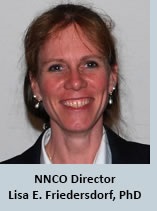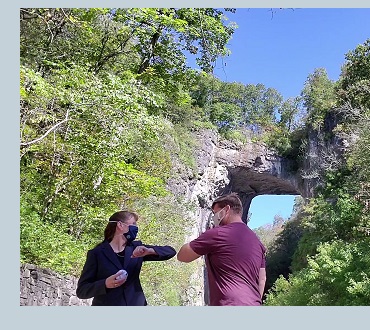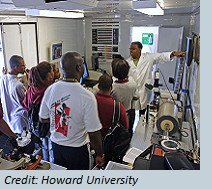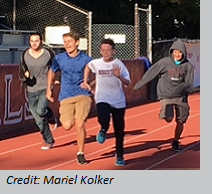NNCO Quarterly Newsletter: Fall 2020 Edition

|
| WHAT’S BIG IN SMALL SCIENCE? A Quarterly Newsletter of the National Nanotechnology Coordination Office (NNCO) |
|
DIRECTOR’S CORNER
Finally, I was very fortunate that virtual options enabled me to listen in to the European Foundation for Clinical Nanomedicine (CLINAM) and National Cancer Institute Alliance for Clinical Nanomedicine meetings. Both meetings featured experts from around the world presenting remarkable work in many different areas of nanomedicine. Special sessions focused on the application of nanotechnology to address the coronavirus pandemic, providing approaches for protection, detection, and treatment—or “shield and spear,” as one presenter put it. It is clear that a foundational understanding at the nanoscale aided in the response to the crisis, but this story is still unfolding and will be told at the appropriate time. We welcome your highlights. I am extremely optimistic about the vaccines, many of which incorporate nanotechnology, and look forward to in-person meetings in the not-too-distant future. In the meantime, stay safe in the coming holiday season. I’ll see you on the other side. |
|
NEWS FROM NNI AGENCIES Biotechnology company Moderna announced on Nov. 30, 2020, that the investigational COVID-19 vaccine that it developed in collaboration with scientists at NIH’s National Institute of Allergy and Infectious Diseases, which is also delivered via nanoparticles, is 94.1% effective at preventing COVID-19. That same day, Moderna requested emergency use authorization for the vaccine from FDA. On Nov. 30, 2020, biotechnology company Novavax announced that two of its three clinical trials (phase 3 clinical trial in the United Kingdom and phase 2b clinical trial in South Africa) are now fully enrolled and that a third, phase 3, clinical trial in the United States and Mexico will begin soon. The three clinical trials are testing the efficacy of a recombinant S protein vaccine delivered via nanoparticles, which was developed with funding from BARDA and DOD. The following examples highlight nanotechnology research advances that were recently announced: Medicine carriers made from human cells can cure lung infections (funded by NIH); Implantable sensor could measure bodily functions—and then safely biodegrade (funded in part by NSF); Nanomedicine crosses into brain, eradicates recurring brain cancer in mice (funded by NIH); A step toward a universal flu vaccine (funded by NIH and NSF); Liquid nanofoam: A game changer for future football helmets (funded by NSF); Desalination of industrial-strength brine with nanomaterials (funded by NSF); Room-temperature conversion of CO2 to CO: A new way to synthesize hydrocarbons (funded by NIST); Flash graphene rocks strategy for plastic waste (funded by DOD, DOE, and NSF); Breakthrough quantum-dot transistors create a flexible alternative to conventional electronics (funded by DOE); Graphene-based memory resistors show promise for brain-based computing (funded by DOD); A novel, low-cost method detects nanoscale contaminants during manufacture of semiconductor devices (funded in part by NIST); New device powers wearable sensors through human motion (funded by NASA); “Better” copper means higher-efficiency electric motors (funded in part by DOE); Engineers print wearable sensors directly on skin without heat (funded by NSF). USDA/NIFA has released its FY 2021 and 2022 AFRI Foundational and Applied Science RFA, including its program on Nanotechnology for Agricultural and Food Systems (Program Area Priority Code: A1511). NASA’s SBIR Phase I solicitation is open from Nov. 9, 2020 through Jan. 9, 2021. Several of the topics specifically encourage nanotechnology-enabled proposals. |
|
NANOTECHNOLOGY COMMERCIALIZATION Commercialization of nanotechnology-enabled products continues to advance, with several recent announcements from companies across the country. One of the companies, located in Pennsylvania, has developed a nanoscale zinc primer for corrosion prevention. The primer is applied between the base metal and finish coat to improve the corrosion resistance of high-end automobile underbody components. Another company, based in Connecticut, has introduced a family of carbon-nanotube-based prepregs (fabrics pre-impregnated with a resin system) for aerospace applications, primarily unmanned vehicles but including Airbus 350 XWB aircraft assembled in 2020 and beyond. A company located in Maryland has begun offering a new product that will deliver unparalleled brightness, clarity, and operating efficiencies for a broad range of display and optoelectronic applications. The product is being offered in 10 nm and 20 nm capped nanocrystal configurations in formulations and as dispersions. The company has raised over $50 million in private funding and has been awarded 16 SBIR/STTRs. |
|
NANOTECHNOLOGY ENVIRONMENTAL, HEALTH, AND SAFETY (nanoEHS) IMPLICATIONS The 2021 NNI nanoEHS webinars will kick off in early 2021. This webinar series will review advances in nanoEHS research in the context of the six research needs identified in the 2011 NNI EHS Research Strategy (nanomaterial measurement infrastructure, human exposure assessment, human health, environment, risk assessment and risk management methods, and informatics and modeling). More information on the webinar series will be posted on nano.gov as details are finalized. |
|
STEM EDUCATION
The Center for Nanotechnology Education and Utilization at Penn State is organizing a free, virtual workshop to introduce nanotechnology to secondary and post-secondary science and technology teachers, vocational and technical teachers, guidance counselors, and school administrators. The goal of the workshop is to help participants gain a basic understanding of nanotechnology, learn about opportunities and pathways for students, and discover activities and content that can be used to create lessons or workforce development programs. The workshop sessions will be held virtually on six consecutive Fridays: Jan. 22, Jan. 29, Feb. 5, Feb. 12, Feb. 19, and Feb. 2, 2021, and certificates of completion will be provided upon request at the conclusion of the workshop. More information is available here. Workshop registration is available at this link. K–12 teachers, there is a vast array of classroom-ready nanotechnology resources, including NanoHub and resources for educators from NNCI. For more information about resources, please contact nanoed@nnco.nano.gov. If you are interested in free brochures for your classroom, please contact us. |
|
NANOTECHNOLOGY AND YOU The NNI will hold a virtual stakeholder workshop on Jan. 11–13, 2021. Over the past 20 years, the NNI has supported nanotechnology discovery, development, and deployment, and has nurtured the strong ecosystem that exists today. Building on this foundation, nanoscience will underpin a wide range of advanced technologies and enable solutions to future challenges. As the NNI plans for the future, conversations at this workshop will identify effective mechanisms to advance research and development, strategies for communication, and priority topics to shape future directions. More information about the workshop is posted on nano.gov. Nanotechnology Day is an annual event featuring community-led events and activities on or around Oct. 9 to help raise awareness of nanotechnology, how it is currently used in products that enrich our daily lives, and the challenges and opportunities it holds for the future. This year, Nanotechnology Day (held on Friday, Oct. 9, 2020) went virtual. Participating organizations included Federal Government agencies, technical and professional societies, NNI-funded research centers and user facilities, universities, private-sector organizations, and international organizations. Activities included webinars, videos, infographics, online materials related to nanotechnology, and an extensive social media presence (especially on Twitter). For example, FDA held a virtual research symposium on Oct. 9, 2020, showcasing over a decade of progress and innovation in nanotechnology at FDA (a recording of the symposium is available here). NanoFabNet created a special 8-minute video celebrating Nanotechnology Day that features a paper buckyball being relayed among people from different nanotechnology organizations. Check out highlights of activities from Nanotechnology Day 2020! Through three different podcast series, guests explore nanotechnology topics from different perspectives: Stories from the NNI episodes are conversations with experts from the NNI community who share their perspective on advances that have been made and future prospects for nanotechnology. Recent episodes feature Gerhard Klimeck (Purdue University), Tequila Harris (Georgia Tech), Jamey Wetmore (Arizona State University), Sean Hearne (Oak Ridge National Laboratory), Jessica Winter (Ohio State University), Mike Hochella (Pacific Northwest National Laboratory and Virginia Tech), Jared Ashcroft (Pasadena City College), and Nazanin Bassiri-Gharb (Georgia Tech). Nano Matters episodes explore specific nanotechnology topics for a broad audience. Recent episodes feature Jessica Winter (Ohio State University), Jamey Wetmore (Arizona State University), Tequila Harris (Georgia Tech), and Nazanin Bassiri-Gharb (Georgia Tech). Nano Entrepreneurship Network episodes highlight best practices, resources, and advice from nanotechnology entrepreneurs and those who support them. Recent episodes feature Jessica Winter (Ohio State University, Core Quantum Technologies) and Ankit Agarwal (Imbed Biosciences). |
|
During the month of October, Friedersdorf gave a presentation entitled “Nanotechnology Research and Development for the Coming Decades” at the Virtual NanoScientific Symposium for a Changing World (Oct. 14–15, 2020). At the Annual Conference of the NSF-funded National Nanotechnology Coordinated Infrastructure (Oct. 26–27, 2020), Friedersdorf’s presentation highlighted efforts to plan for the future of the NNI and opportunities to participate. She also heard updates regarding NNCI, one of the critical pieces of the NNI infrastructure supporting user facilities for researchers and developers alike. As an attendee of the European Foundation for Clinical Nanomedicine (CLINAM) Meeting (Oct. 25–28, 2020), Friedersdorf had the opportunity to learn about significant advances in nanomedicine from experts around the world. Friedersdorf, NNCO Deputy Director Stacey Standridge, and Contract Staff Scientist Maria Fernanda Campa attended the National Cancer Institute’s Alliance for Nanotechnology in Cancer Principal Investigator Meeting on Nov. 5–6, where they saw some of the inspiring research funded by this important program. There was also a session focused on the application of nanomedicine to help address the coronavirus pandemic. On Nov. 12–13, 2020, NNCO Contract Staff Scientist Rhema Bjorkland participated in the 9th Nano Conference organized by the Sustainable Nanotechnology Organization (SNO)/Nanotechnology Occupational and Environmental Health (NanoEH) Committee. A theme that emerged was the importance and prominent use of the maturing nanoEHS research and risk management framework by communities, the health care sector, and small businesses to tackle the challenges of the COVID-19 pandemic. |
|
UPCOMING EVENTS Dec. 9–11, 2020: Tokyo, Japan (and online) Jan. 11–13, 2021 Jan. 22–Feb. 26, 2021 Early Feb., 2021 June 14–16, 2021 |
|
www.nano.gov | info@nnco.nano.gov Click here to subscribe to our newsletter. |


 The fall has seemed exceptionally busy this year, and while NNCO continues its work remotely, I have enjoyed many opportunities to engage with the nanotechnology community. In September, the virtual environment enabled even more participation than usual in the annual U.S.-EU nanoEHS Communities of Research (COR) workshop, and colleagues from around the world were able to engage in active discussions. The CORs continue to be an important forum for sharing environmental, health, and safety information related to nanotechnology. The theme of the workshop was a new take on the longstanding “bridging” concept (reflecting the intent of the CORs to connect American and European researchers) to include bridging insights and perspectives. For example, workshop discussions explored how lessons learned from nanoEHS research can be applied to other areas, including emerging technologies and incidental nanomaterials such as nanoplastics.
The fall has seemed exceptionally busy this year, and while NNCO continues its work remotely, I have enjoyed many opportunities to engage with the nanotechnology community. In September, the virtual environment enabled even more participation than usual in the annual U.S.-EU nanoEHS Communities of Research (COR) workshop, and colleagues from around the world were able to engage in active discussions. The CORs continue to be an important forum for sharing environmental, health, and safety information related to nanotechnology. The theme of the workshop was a new take on the longstanding “bridging” concept (reflecting the intent of the CORs to connect American and European researchers) to include bridging insights and perspectives. For example, workshop discussions explored how lessons learned from nanoEHS research can be applied to other areas, including emerging technologies and incidental nanomaterials such as nanoplastics.  In October, we were thrilled to see how people celebrated Nanotechnology Day (October 9th, for 10
In October, we were thrilled to see how people celebrated Nanotechnology Day (October 9th, for 10 On Nov. 19, 2020, pharmaceutical company Pfizer and its German partner BioNTech
On Nov. 19, 2020, pharmaceutical company Pfizer and its German partner BioNTech  A new episode from the
A new episode from the  The
The  The
The  Many thanks to everyone who responded to the
Many thanks to everyone who responded to the  During the month of September, in addition to the U.S.–EU nanoEHS COR workshop, NNCO Director Lisa Friedersdorf attended
During the month of September, in addition to the U.S.–EU nanoEHS COR workshop, NNCO Director Lisa Friedersdorf attended  Presentations available online
Presentations available online

